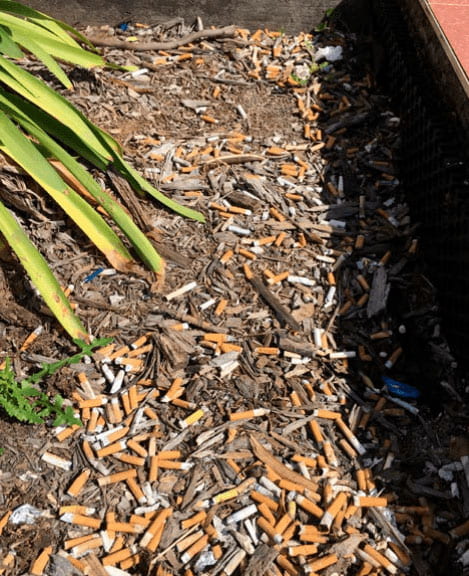Cigarette butts account for 78% of all items littered in Aotearoa New Zealand and these are the most commonly found item in beach litter clean ups. A significant proportion of people who litter cigarette butts in Aotearoa New Zealand don’t recognise them as plastic or consider it littering. We’re not alone facing this issue. It is estimated that of the 5.5 trillion cigarettes produced worldwide, 4.5 trillion cigarette butts are littered.[1] This makes cigarette butts the most littered item on Earth. The evidence suggests that we need educational efforts and new systems to support smokers to change the practice of discarding cigarette butts to stop this form of pollution at source. There is a need to change perceptions about cigarette butts as harmless litter. This will be complex as litter forms part of the smoking ritual itself.
There is a need to change perceptions about cigarette butts as harmless litter
After finding similar results in their local litter studies, the NSW Environment Protection Authority (EPA) led a collaborative behaviour change trial in partnership with 16 local councils to understand what strategies are effective in reducing cigarette butt littering behaviour. Four key strategies were tested across 40 smoking sites:
- Pathways: Creating the best environment for smokers to correctly dispose of their butts by placing signs on butt bins and stencils on the ground to create pathways to the location of butt bins.
- Pride and Ownership: Encouraging smokers to develop a sense of pride in, and ownership of, the area as a comfortable and welcoming place for smokers, thereby creating a commitment to bin their butts.
- Positive Social Norming: Encouraging smokers to believe it is expected that smokers using the area will dispose of their cigarette butts in the bins provided; calling on smokers to act responsibly, reinforcing positive feelings they get from disposing correctly and meeting a target of zero butt litter for the location.

It is estimated that 4.5 trillion cigarette butts are littered making them the most littered item on Earth. Credit: NSW EPA
- Enforcement: Raising the risk attached to littering by drawing smokers’ attention to fines; boosting patrols with rangers (enforcement officers) speaking to smokers in the locations to increase the rangers’ visibility; and providing an incentive not to litter based on avoiding a penalty, with the option to move on to ‘hard enforcement’ that involves issuing infringement notices to smokers who litter their butts.
Each strategy led to an increase in binning rates. The best results were consistently found with ‘pride and ownership’ strategies, though participants considered the pathways approach to be the easiest and most cost-effective intervention.
Efforts to reduce littering of cigarette butts into our environment could look to the learnings from the NSW EPA behaviour change study and follow the roll-out of the full programme in 2020.
Supporting the change in behaviour for smokers who litter cigarette butts could be done in conjunction with policy measures that further reduce the likelihood of cigarette butts entering our environment, such as product stewardship frameworks, deposit schemes and recycling programs.
